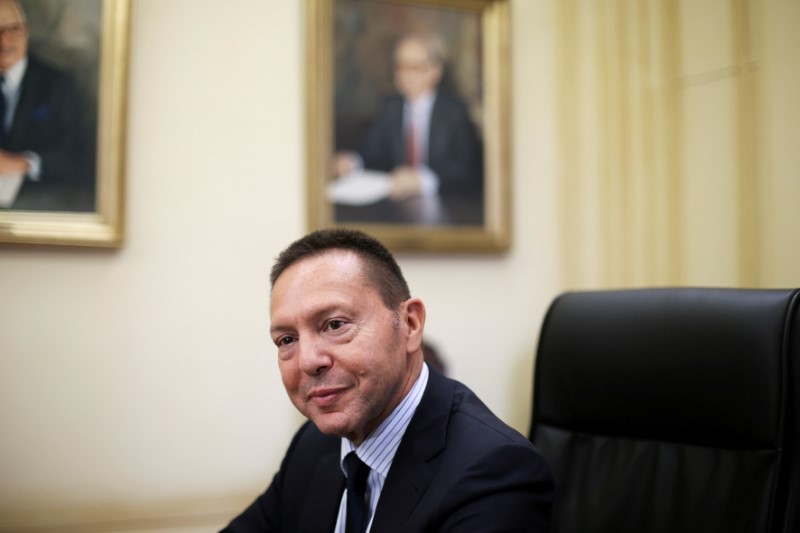 © Reuters. FILE PHOTO: Governor of the Central Bank of Greece Stournaras looks on during an interview with Reuters at the bank’s headquarters in Athens
© Reuters. FILE PHOTO: Governor of the Central Bank of Greece Stournaras looks on during an interview with Reuters at the bank’s headquarters in AthensATHENS (Reuters) – Greece’s economic recovery depends on it following through with the reforms and privatizations prescribed in its bailout program, the head of its central bank said on Friday.
Greece’s economy is recovering after a deep, multi-year recession, and growth is set to pick up in the next two years, assuming a speedy conclusion of the next bailout review which is set to start next week, the central bank has said.
The Bank of Greece is projecting economic growth will quicken to 2.4 percent in 2018 from an estimated 1.7 percent this year. But its governor, Yannis Stournaras, said the rosy forecast depends on keeping up the pace of change.
“Our projections for economic recovery are based on the assumption that the program of reforms and privatizations will be implemented smoothly and according to plan,” he told a conference.
The government’s reform plans include opening up the energy market to competition by selling units of the main electricity provider Public Power Corp; unifying scores of state pension funds into one uniform fund; and making the public sector more efficient by promoting digital technology.
Reform will boost the country’s prospects and investors’ confidence, Stournaras said. This would improve the banking system’s liquidity and help reduce the Greek government’s borrowing costs.
It will also be necessary to enable sustainable access to capital markets after Greece’s 86 billion euro bailout program, its third since 2010, ends in August next year.
“Domestic savings cannot suffice to cover the Greek economy’s investment needs,” Stournaras said. “The only way to plug the large investment gap is to attract foreign direct investment toward the most productive sectors of the economy.”
(reporting by George Georgiopoulos; editing by Peter Graff)
Fusion Media or anyone involved with Fusion Media will not accept any liability for loss or damage as a result of reliance on the information including data, quotes, charts and buy/sell signals contained within this website. Please be fully informed regarding the risks and costs associated with trading the financial markets, it is one of the riskiest investment forms possible.
Source: Investing.com





























